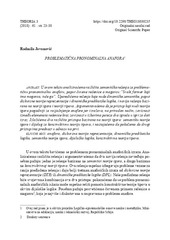Приказ основних података о документу
Problematična pronominalna anafora
Problematic Pronominal Anaphora
| dc.creator | Jovanović, Radmila | |
| dc.date.accessioned | 2021-10-12T12:40:43Z | |
| dc.date.available | 2021-10-12T12:40:43Z | |
| dc.date.issued | 2018 | |
| dc.identifier.issn | 0351-2274 | |
| dc.identifier.uri | http://reff.f.bg.ac.rs/handle/123456789/2501 | |
| dc.description.abstract | U ovom tekstu analiziraćemo različita semantička rešenja za problematičnu pronominalnu anaforu, poput čuvene rečenice o magarcu:"Svaki farmer koji ima magarca, tuče ga". Uporedićemo rešenja koje nude dinamičke semantike, poput diskursne teorije reprezentacije i dinamičke predikatske logike, i novija rešenja bazirana na teoriji igara i teoriji tipova. Argumentovaćemo da je pristup koji nudi teorija igara pogodniji za razjašnjenje anafore jer izražava, na prirodan način, zavisnost između elemenata rečenice kroz zavisnost u izborima poteza dva igrača u igri za dati izraz. Izložićemo dva različita pristupa bazirana na teoriji igara: semantiku teorije igara i dijalog za konstruktivnu teoriju tipova, i nastojaćemo da pokažemo da drugi pristup ima prednost u odnosu na prvi. to be much more promising in the analysis of a natural language then the classical Tarskian"inside-out" approach. However, I will argue that the dialogical approach has the advantage over GTS because it provides a clear first-order solution that does not require any devices other than those of constructive or classical logic. | SR |
| dc.description.abstract | In this paper I will analyse some problematic cases of pronominal anaphora, such as the famous donkeysentence: Every man who owns a donkey beats it. The issue is to provide a satisfactory semantic analysis of pronouns "he" or "it", which is challenging when the anaphoric pronoun in question depends on an indefinite. I will compare solutions provided by dinamic semantics, such as Discourse Representation Theory and Dinamic Predicate Logic, with new solutions using Game Theorethical Semantics (GTS) and Constructive Tipe Theory (CTT). I will scketch a dialogical account of anaphora, making use of CTT. I will argue that the game theoretical approach, which puts emphasis on expressing the dependence relations in terms of choices resulting from interaction, is in fact the best way to deal with anaphora. Moreover, the "outside-in" semantics seems | EN |
| dc.publisher | Srpsko filozofsko društvo, Beograd | |
| dc.relation | info:eu-repo/grantAgreement/MESTD/Basic Research (BR or ON)/179067/RS// | |
| dc.rights | openAccess | |
| dc.source | Theoria | |
| dc.subject | semantika teorije igara | SR |
| dc.subject | konstruktivna teorija tipova | SR |
| dc.subject | diskursna teorija reprezentacije | SR |
| dc.subject | dinamička predikatska logika | SR |
| dc.subject | dijaloška logika | SR |
| dc.subject | anafora | SR |
| dc.subject | Game Theory Semantics | EN |
| dc.subject | donkey-sentence | EN |
| dc.subject | Discourse Representation Theory | EN |
| dc.subject | Dinamic Predicate Logic | EN |
| dc.subject | Dialogical Logic | EN |
| dc.subject | Constructive Tipe Theory | EN |
| dc.subject | anaphora | EN |
| dc.title | Problematična pronominalna anafora | SR |
| dc.title | Problematic Pronominal Anaphora | EN |
| dc.type | article | |
| dc.rights.license | ARR | |
| dc.citation.epage | 38 | |
| dc.citation.issue | 3 | |
| dc.citation.other | 61(3): 23-38 | |
| dc.citation.rank | M24 | |
| dc.citation.spage | 23 | |
| dc.citation.volume | 61 | |
| dc.identifier.doi | 10.2298/THEO1803023J | |
| dc.identifier.fulltext | http://reff.f.bg.ac.rs/bitstream/id/1221/2498.pdf | |
| dc.type.version | publishedVersion |

